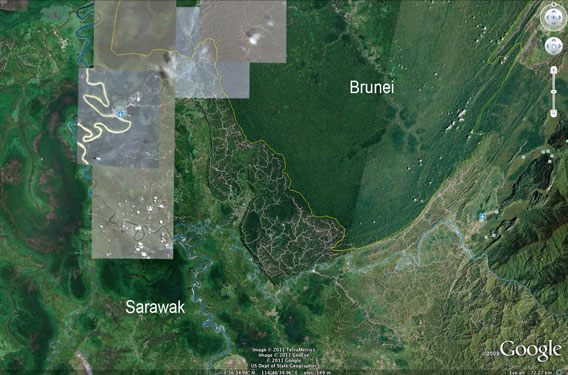
Logging roads and damaged forest in Sarawak compared with the healthy forest of Brunei. Photo courtesy of Google Earth.
The leader of the Malaysian state of Sarawak has acquired billions of dollars’ worth of “illicit” assets, alleges a new investigation by the Bruno Manser Fund, which reveals holdings in over 400 companies across two dozen countries.
Chief Minister Abdul Taib Mahmud, who has ruled Sarawak, the western-most state in Malaysian Borneo since 1981, has long been suspected of amassing vast amounts of wealth through his close ties to logging and plantation companies. But the new allegations from the Bruno Manser Fund put some numbers on the scale of his family’s holdings, which include substantial stakes in Cahya Mata Sarawak, a construction conglomerate that has benefited from a cement monopoly and from untendered public contracts awarded by the Taib-led Sarawak state government; Custodev Sdn Bhd, a Sarawak property development firm; Ta Ann Holdings Bhd, a logging company widely maligned by environmentalists and indigenous rights activists; and Achi Jaya Holdings, which has a monopoly over log exports from Sarawak, according to the Bruno Manser Fund.
Lukas Straumann, the director of the Bruno Manser Fund, said the holdings reflected Taib’s corrupt rule and demanded anti-money laundering authorities increase the scrutiny of Taib assets in Malaysia and abroad. Taib is currently under investigation by the Malaysian Anti Corruption Commission.
“We consider these corporate interests of the Taib family to be illicit assets”, said Straumann in a statement. “There are many clear indications that Taib has abused his public office to build a corruption and fraud-based billion-dollar empire.”
“We are shocked to see that the Taib family has so shamelessly enriched itself while the people of Sarawak have to struggle with widespread poverty and an appalling lack of infrastructure and government services.”
332 of the companies held by the Taib and his immediate family are based in Malaysia. Another 22 are in Australia, nine in Canada, seven each in the British Virgin Islands and Hong Kong, six in the United States, five in New Zealand, and four in Great Britain, according to a list [PDF] released the Bruno Manser Fund.
Related articles














